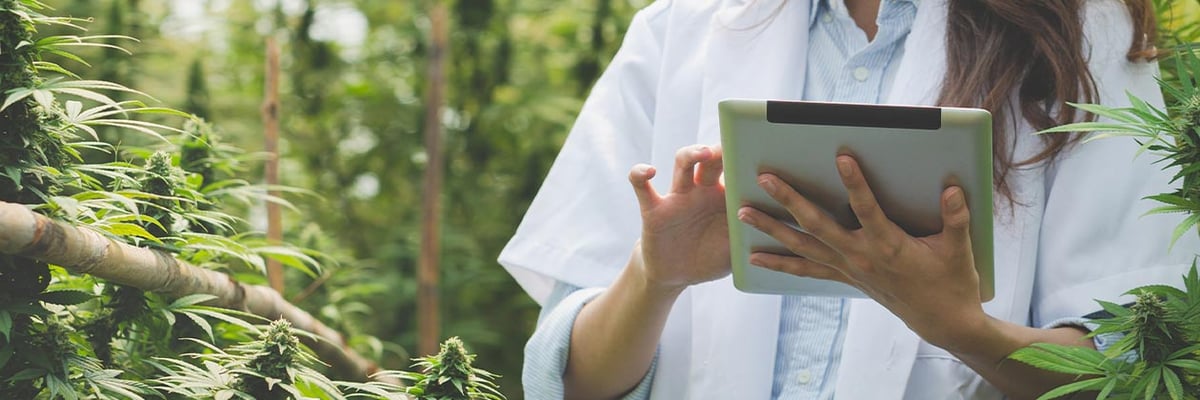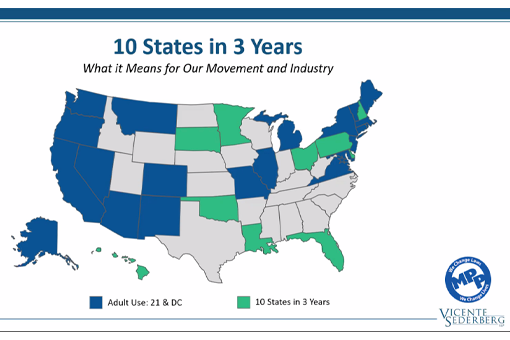Author: Ben Hartman | March 29, 2023 | 6 Min Read
“The Low Hanging Fruit is Gone” - The Marijuana Policy Project Pursues Legalization in 10 States in 3 Years

Cannabis legalization in Delaware moved one step closer to becoming a reality on Tuesday when the state’s senate approved two bills that would legalize cannabis possession and set up a framework for legal recreational cannabis sales.
Both measures have already been approved by the state’s House of Representatives. They now head to Governor John Carney who is known as a vocal opponent of cannabis legalization.
If things go as activists hope, Delaware will become the 22nd state to legalize recreational marijuana. But Delaware is already part of a series of would-be cannabis markets that the Marijuana Policy Project is watching very closely.
The MPP’s “10 States in 3 Years'' initiative is supporting cannabis legalization campaigns in 10 states spreading from Hawaii to Delaware. The states include Louisiana, Oklahoma, South Dakota, Minnesota, Hawaii, Florida, Ohio, Pennsylvania, Delaware, and New Hampshire.

The Oklahoma leg of the campaign hit a serious stumbling block earlier this month when voters rejected a ballot measure that would have legalized adult cannabis in the state. The move was met with strong opposition in Oklahoma, which is known for having a particularly robust medical cannabis market.
Alex Langer, the Manager of Development for the MPP told Rootwurks that in addition to the very well-organized opposition to legalization, there was also the difficulty of winning a campaign when legalization is the only issue on the ballot and not a measure added to the ballot during a general election. And of course, funding is always an issue.
“Obviously more funding would have helped but it was really just hard to get out the vote at this odd time when people don't even know that there is something on the ballot,” Langer said.
Langer called the Oklahoma vote “a missed opportunity” and said that the vote showed the same divide between pro-legalization urban voters and rural opponents that can be seen in other states. He said the Oklahoma campaign also presents the sorts of challenges that can be expected when the movement wages marijuana legalization campaigns far from the coasts.
“The Low Hanging Fruit is Gone”
“We’ve gone to blue states and succeeded so now the low-hanging fruit is gone. We have to go into these purple and red states,” Langer said, adding that “we are hoping to put ourselves in a position where we can use language that's going to appeal more to conservative leaders and conservative voters and try to bring them along on this.”
In red states, conservative leaders are seeing the tax revenue garnered from cannabis and are becoming more aware of the issues and more pragmatic about legalization, according to Langer.
“9.1 billion in market growth potential”
According to MPP figures, if the 10 states legalize, it will mean a $9.1 billion increase in the adult-use cannabis market in the United States. This increase would be dramatic in all 10 states but would be especially large in larger states like Florida and Ohio. In these two states, the market increase will be more than $3.1 billion and $2.3 billion, respectively.

Legalization in these 10 states would also mean an increase of 42.6 million in the number of registered voters living in fully-legal cannabis states. It would also mean 6.8 million newly-legal cannabis consumers and that a majority of house republicans would live in legal states.
Cannabis Legalization Ballot Initiatives vs Statehouse legalization
There are two main ways in which legalization becomes law. Voters either have their say at the ballot box or legalization bills make their way through state legislatures and become law.
According to Langer, statehouse campaigns have clear advantages.
“It's a lot more costly to do the ballot initiatives because you have to have organizers all over the state gathering signatures. You have to run ad campaigns, polling, and focus groups instead of being able to narrow your focus to the legislature.”
Langer said that in general, legalization has a better shot in states that pursue it through the legislative.
“It’s a real challenge now to win these ballot initiative fights. You need a lot of money to be effective and the opposition has gotten better at their messaging and at attacking these [legalization] measures.”
But some of these attacks are by no means new.
“It’s Still Reefer Madness”
When asked about the messaging opponents use to strike down legalization campaigns, Langer said “I think they're more sticking with the “Reefer Madness” approach. It’s the approach that says that all the kids are gonna be using it, everyone's gonna get addicted and become lazy and they’ll [cannabis dispensaries] replace more wholesome businesses.”
Langer said the sort of fear-mongering seen in the 1936 anti-cannabis film still can find a receptive audience.
“I think the data would probably say it does play better with an older audience, people who have lived most of their lives without cannabis legalization and have got all the propaganda over the decades.”
Whatever the opposition’s messaging though, Langer said that legalization advocates have some clear takeaways from previous campaigns to learn from.
“The basic lesson is that if it's not a well-funded effort, it might not be worth doing. You have to have a very kind of diverse coalition. Trying to go at it with just getting like Democrats and progressive groups or things like that doesn't really work in the environment that we're in now.”
10 States in 3 years - the Morning After
If all 10 of the states on the MPP list legalize in the next three years, the impact would be tremendous, according to Langer.
“We’d have well over 50% of the population living in legal states,” Langer said, adding that well over half of US senators would be from legal states, and for politicians “the pressure to act [on federal legalization] would be just overwhelming at that point.”
The effect on the criminal justice system would also be immense. Langer cited the around 40,000 people in prison in the U.S. for non-violent cannabis offenses and how police use the smell of cannabis as justification to stop people.
Sometimes, incremental is best
Langer cautioned against an “all-or-nothing” approach to legalization and described how the medical marijuana market can encourage the eventual opening of an adult-use market in states across the country.
“Once there’s a medical program and people see, oh, this isn’t destroying our society and people who need it are getting access, they’re more likely to support adult-use legalization.”
He added that “there are some groups in the movement that want every policy to be absolutely perfect from the beginning and they want to achieve all their goals at once. We take more of a pragmatic approach. You live to fight another day and hopefully improve these policies over time.”
In addition to the 10 states legalization initiative, in 2023 MPP launched the Legalization Now! National Task Force. The group describes it as “an urgent call to action bringing together the foremost thought-leaders and change-makers in the cannabis reform movement to advance a bold national strategy for ending federal cannabis prohibition.”
According to MPP, the task force “will identify and capitalize on opportunities to advance legalization and reform policies in states across the country that will drive momentum forward and pave the way for comprehensive federal reform.”
To hear more about the Marijuana Policy Project's "10 States in 3 Years" campaign and why legalization can be so complicated, join us for this Rootwurks webinar. Register here.
.jpg?width=1200&height=628&name=Can-10-More-States-Legalize-in-the-Next-3-Years--%20(1).jpg)
Contributors

Ben Hartman
From HACCP certification to the basics of hygiene, our on-demand courseware has you covered.







